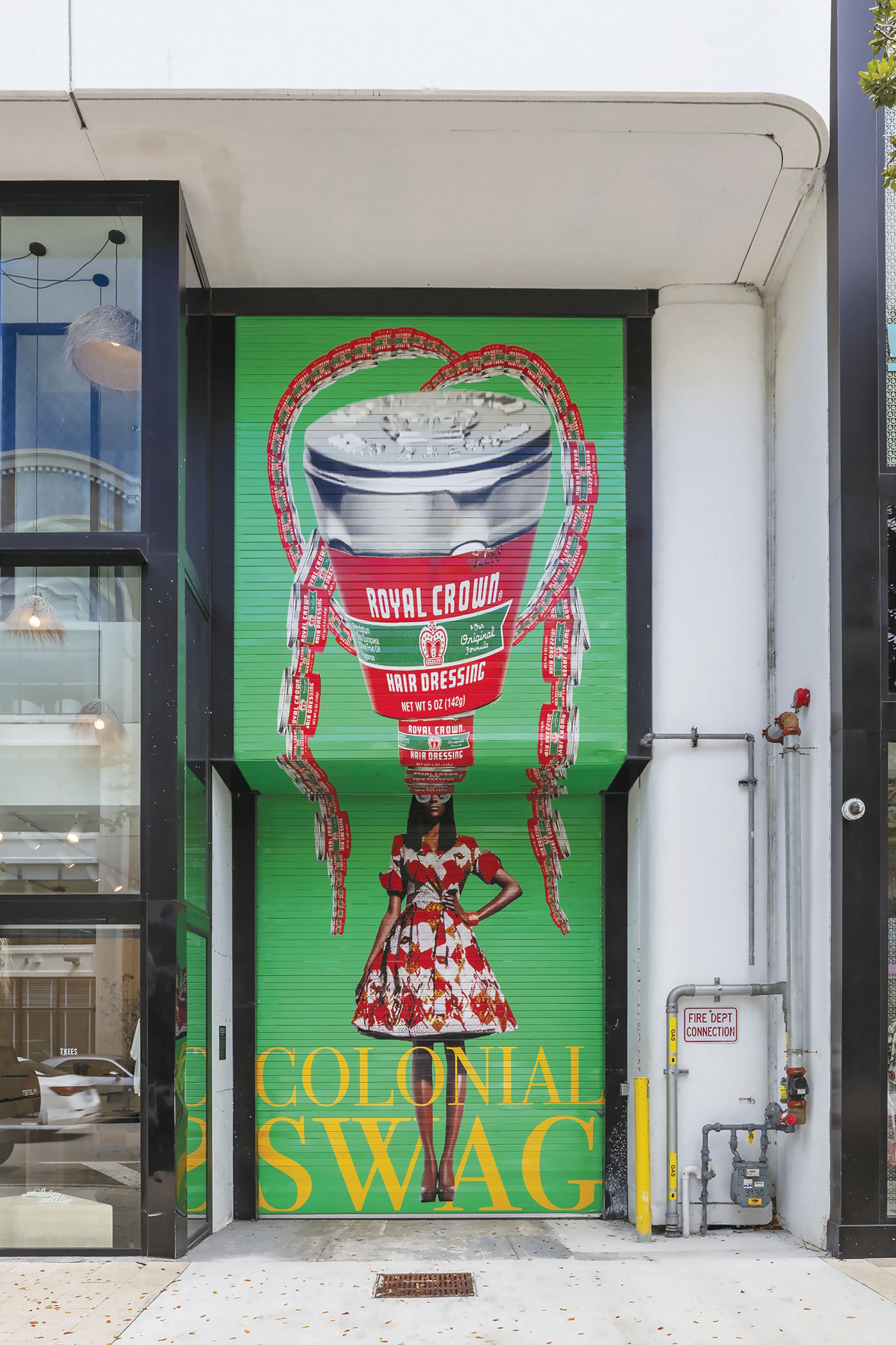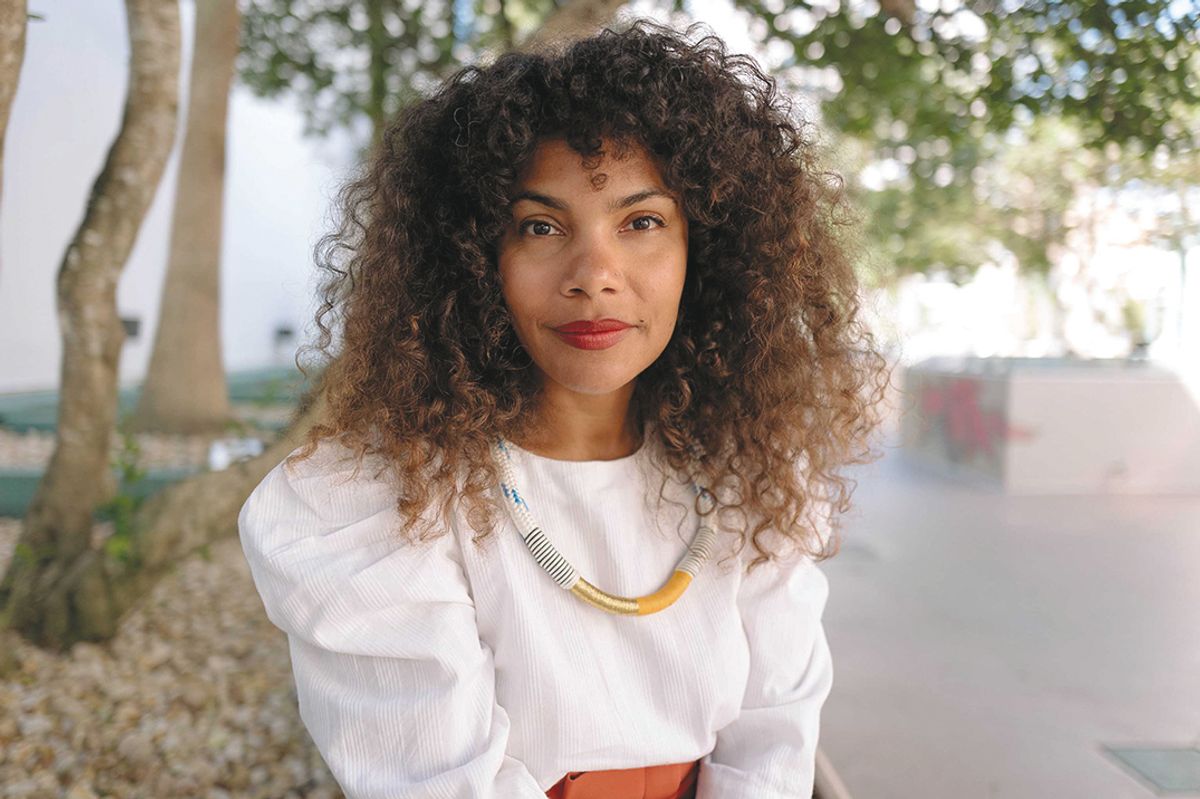On Atlantica, a fictional home planet conceived by the artist April Bey, Colonial Swag is, as Bey has described it, “a high-fashion luxury brand… that uses fully sustainable, ethically mined colonialism from Earth’s developing countries to create beautiful, priceless pieces of fashion”. Her painting Colonial Day Sale: What Are You Gonna Do, If You Like a Woman and Your Mama No Like Am? (2021) is located in the Miami Design District, where it is surrounded by the Earth’s luxury brands. The collaged vinyl print’s billboard format offers a glimpse of Colonial Swag’s branding while playfully yet sharply critiquing the surrounding neighbourhood. At the centre of Colonial Day Sale, a model wears a gigantic headpiece comprising images of the Black hair product Royal Crown, its fish-eye distortion emphasised by the work’s placement on a garage roller door.
The piece is presented by Fringe Projects, a public-art commissioning body that allows for experimentation with public works in many media, including installations, performances and murals.
Dejha Carrington, an arts worker, curator and the co-founder of the arts membership programme Commissioner, saw the work “hiding in plain sight” a year ago and was immediately moved. Carrington is a fan of both this piece and of Bey’s entire practice, including the artist’s Equity in Collecting Program, an initiative designed to support potential collectors who might be otherwise unable to collect art because of the art world’s socially and financially inequitable constraints. (For Commissioner’s part, during Miami Art Week, on Thursday the organisation presented Boomboomboom!!, a procession and offering by the Commissioner-supported the artist Loni Johnson at the Untitled Art fair, and a book signing at Dale Zine Publishers with the photographer Anastasia Samoylova.) Carrington describes her first experience with Bey’s work and what it meant to her.

April Bey’s vibrant Colonial Day Sale: What Are You Gonna Do, If You Like a Woman and Your Mama No Like Am?, in the Miami Design District, is a droll comment on the luxury brands that surround it
© Jill Peters
The Art Newspaper: When did you first encounter April Bey’s Colonial Day Sale? Do you recall that experience?
Dejha Carrington: Around this time last year, I organised a walking tour of the Miami Design District and the Craig Robins Collection with [the shoe and streetwear brand] On Running. While researching, I saw April Bey’s brilliant work hiding in plain sight on 40th Street.
What attracted you to this piece?
I’m drawn to the familiar. The towering Black figure crowned in Royal Crown—a product that defined a generation of slick back ponytails and hair shine—felt intimate, like an ode for people of a shared experience.
Were you familiar with Bey’s Colonial Swag project before seeing this work?
I was. Bey’s Colonial Swag uses pop culture to address the lasting impacts of colonialism, while also imagining possibilities and the aesthetics of cultural reclamation. It’s inspiring.
What do you love about the artist’s Equity in Collecting Program?
Bey’s Equity in Collecting Program is poetic in creating a pathway for appreciators often left out of the collector experience to be stewards of her work. The application makes clear who the initiative is for and for them/us, the artist leverages the enthusiasm of her market to subsidise the cost.
I’m someone constantly thinking about ecosystems and alternative models for supporting artists through my work with Commissioner, and we can be deliberate about reframing power and inclusion. Collecting art is memory work. By interrogating notions of ownership, we decentre antiquated concepts around who collects art and help ensure our stakeholders reflect our communities.
Why are public works of art like these—especially in a location like the Miami Design District—so important?
It feels like Bey is both staging an intervention and seducing us with her aesthetic. Bey’s work on a garage door amplifies the themes of accessibility and the everyday, bringing art into a space that’s public, functional and often overlooked in traditional art contexts. The garage door, typically a mundane or utilitarian surface, transforms into a canvas for dialogue and collective memory. This surface disrupts the notion of art as confined to galleries or museums, and instead situates it within the rhythm of daily life.
- April Bey, Colonial Day Sale: What Are You Gonna Do, If You Like a Woman and Your Mama No Like Am?, next to 170 NE 40th Street, Miami


